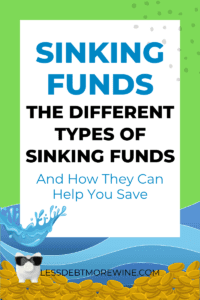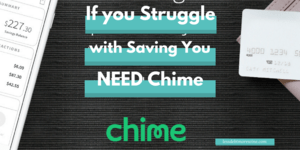Life After Debt: What You Should & Shouldn’t Do With Your New Cash Flow.
THIS POST MAY CONTAIN AFFILIATE LINKS. MEANING I RECEIVE COMMISSIONS FOR PURCHASES MADE THROUGH THOSE LINKS, AT NO COST TO YOU. PLEASE READ MY DISCLOSURE FOR MORE INFO.
Hey everyone, today I’m super excited to have a guest post from Michelle at Savings & Sangria (she’s a girl after my own heart talking money and booze) where she is going to share some tips on how to handle your money once you reach life after debt.
Michelle is passionate about teaching #HappyMoneyManagement to young-ish women who want to make saving and investing less work and more fun. She’s been saving since she was eight and investing since eighteen. She has an M.B.A. in Management and Strategy. She recently traded in her career in real estate investing, management, and tax to move to Germany and blog full-time. Check her out at Savings and Sangria. Now onto the post!
So you’ve paid off your student loans and suddenly have hundreds, possibly thousands of dollars more in expendable income every month! What’s the very first thing you should spend money on after making your last student loan payment?
First, Celebrate
Splurge on the celebration of course!
Making your last student loan payment is unbelievably anticlimactic, especially if you autopay, in which case you may not even notice right away that it’s happened. So you need to go out of your way to savor the moment. Splurge on an unforgettable night out, schedule a spa day, or pop open a bottle of rich-people champagne. Just do something to make this moment special because you have so earned it.
Once you’ve properly celebrated, you can move on to more practical ways to use the money you now have available.
So, what should you do with all that extra cash?
Here’s a list of some of the best ways to put that extra money to great use.
Make Sure Your Emergency Savings is Fully-Funded
Personal Finance 101: Everyone should have an emergency fund with enough money to cover at least 3-6 months’ living expenses. You need to be prepared for life’s curveballs: car repairs, medical expenses, lay-offs, etc. If you’ve neglected your emergency fund while paying down your student loans, now’s the time to show it some love. In fact, even if you’re still paying on student loans, you should be building your emergency savings paycheck-by-paycheck so you’re covered when life goes crazy.
Turn Your Focus to Retirement Savings
You may have some catching up to do on your retirement savings if you’ve focused solely on paying off your debt. This is probably where a giant chunk of your newly-available cash flow should go.
Your mission is to “max out” your retirement account. This means you’re going to save the legal maximum allowable amount in your retirement account(s) each year. If you’re wondering why legal max contribution amounts are even a thing, it’s because there are killer tax advantages to retirement savings. The government needs to limit its losses by capping your contributions as follows:
- Employer-sponsored plans (like 401(k)’s and 403(b)’s): $18,000/year if you’re under 50. $24,000/year for people 50 and older.
- Individual Retirement Accounts (IRA’s): $5,500/year if you’re under 50. $6,500/year for people 50 and older.
There are tons of great investment options within your retirement savings plans. I’m partial to stock-based index funds for younger investors, and bond-based index funds for investors closer to retirement.
PS: To avoid the scramble to save enough for retirement later in life, and to take advantage of the magic of compound interest, you should consider starting your retirement savings even while you’re still paying back your student loans.
Adjust Your Existing Life Insurance
You probably have a lot more depending on you and your income now than when you started making your student loan payments years (or even decades!) ago.
Maybe you have a family of your own now. Or maybe you’re taking care of aging parents. And those loved ones rely on your earning power for their financial security. What happens to them if something happens to you?
That’s where life insurance comes in. If, heaven forbid, anything happens to you, your policy will pay out to your beneficiaries so they won’t need to add money-worries to their grief.
You should strongly consider life insurance if you’re married, and you should definitely have life insurance if you have under-age children.
Invest in Your Dreams
You didn’t get out of student loan debt without years of financial sacrifice. What have you gone without or put on hold? Vacations, homeownership, starting your own business? Now that you’ve got some extra money available, you can start saving in earnest to make some of these dreams a reality!
Not saying go crazy here, but investing 5-10% of your income to fund your dreams sounds like a great use of money to me.
Related: Paying Off Debt While Pursuing Big Crazy Dreams
Where to put your “Dream Fund”
Your dream fund deserves its own account. Don’t lump it in with your emergency savings, and don’t keep it lying around your checking account. Why not? Because you want to 1) keep your hands off it so you don’t accidentally spend it on something else, and 2) invest it so it earns interest and grows faster.
But you also don’t want to tie your dream fund money up in the stock market if you’re planning on realizing those dreams in the next seven-ish years. See, the stock market has its ups and downs, and it could just happen to be “down” the day you need to withdraw your money. Leave the stock market for your long-term investments (like those retirement account stock-based index funds) so you have time to ride the stock market roller coaster.
There are tons of different investment vehicles for dream funds, but two of my favorites are Money Market Accounts and Certificates of Deposit (CD’s).
Money Market Accounts
Money market accounts (not to be confused with money market funds, which are stock-market-related) are like slightly more sophisticated savings accounts. They work a lot like savings accounts, but they earn better interest and usually require higher minimum balances in return.
Certificates of Deposit
CD’s are a financial instrument you buy for a set period of time at a set rate of return. For example, you can buy a $500 5-year CD, earning 2.3% interest. So at the end of the 5 years you get your $500 back plus $60 in interest. Generally, the more money you invest and the longer the holding period, the better the interest rate.
Whether you’re going with money market accounts or CD’s, make sure you’re getting the highest yields by comparison shopping. You can check out sites like NerdWallet and Bankrate for lists of financial products and all their relevant info to help you pick the best investment for you.
Consider Investing in Real Estate
Real estate investing might not be for everyone, so I won’t beat you over the head with it. But my real estate investments have taken me to the next level financially, so I’d be doing you all a serious disservice if I didn’t at least mention some of the benefits.
First, real estate ownership makes for a far more comfortable retirement. When you own your home, you don’t have to live in constant fear of rent increases exceeding your fixed income.
Real estate ownership also leverages good, low-cost debt to finance an asset (the property) which ultimately grows your net worth. And yes, this holds true even if the housing market declines and you have to wait out a market downturn. It will come back up.
Finally, you can take this real estate investing a step further to include rental properties, which actually make you money in four different ways!
What Should You NOT Do With All Your Extra Money?
Don’t Pay Down Your Mortgage if You Have a Low Interest Rate
And you should absolutely have a low interest rate. If you don’t have a low rate, you want to consider refinancing asap. Refinancing to a lower rate lowers your monthly payment and reduces the total amount you pay in interest over the term of the loan. You can contact your lender for info on refinancing options or just Google “home loan refinance” to see what interest rates are available and how much you could save by refinancing.
So, why shouldn’t you focus on paying down your mortgage and get truly “debt-free”? Short answer: because you’ll probably make more by investing the money than you’ll save by paying down the debt. Most home loans are around 4-5%. That’s far lower than the 7% long-term average returns on the S&P 500 Index. So you’d be better off investing that money for bigger returns than paying off debt for smaller interest savings.
Don’t Invest in Individual Stocks
Think back to late 2012 when everyone and their brother was in love with Chipotle. I still love them, but I think I’m in the minority now! They had a fresh product, a killer business model, and their stock was skyrocketing. Investors were clamoring for Chipotle stock, driving the stock price from $243 in October, 2012 to $749 in August 2015. Then E. coli hit, and boom, their stock imploded. In the year following the outbreak, Chipotle stock plummeted to $370. And while it’s currently up to about $416, there are no signs indicating a full recovery any time soon, if ever.
The point is: the stock market naturally fluctuates, and you can expect the market as a whole to recover from just about any economic disaster. Even the Great Recession as we’ve all witnessed. Individual stocks, however, are not so predictable or resilient.
There are so many products available now to automatically diversify your portfolio and mitigate your risk. Look into Index Funds and Mutual Funds, which are basically assortment baskets full of stocks from a bunch of companies. So there’s no need to put all your eggs in one stock. You can easily begin investing in Funds through Acorns, a ground-breaking app that rounds your purchases up and drops the spare change into your Acorns investment account.
So What Are Your Plans for Your Newly-Freed-up Income?
Hope you enjoyed this list of what to do, and what not to do, with all the extra cash hanging out in your checking account once your student loans are gone forever.
What are your plans for all that money? I’d love to know how you’re prioritizing all the cool things you can do with the extra cash flow. Leave a comment to let me know!




What if your retirement plan is real estate? 🙂
OOhhh, great point, Matt! Absolutely, if you’re building a real estate portfolio as your retirement plan, you’re going to need to be paying down those mortgages to free up equity and qualify for mortgages on multiple properties.
I would caution against using real estate exclusively as your retirement plan and recommend diversifying with some index funds in tax-advantaged retirement accounts like 401(k)’s and IRA’s.
Also, if you’re going real estate-heavy, you might want some geographic diversity. It makes the property management a little more difficult, but it could save your tush in the case of a local market decline. I’ve seen this happen in IL where a major employer goes under, and the entire local market sinks.
But I’m a big believer in real estate investing and plan to use my properties for retirement cash flow as well 🙂